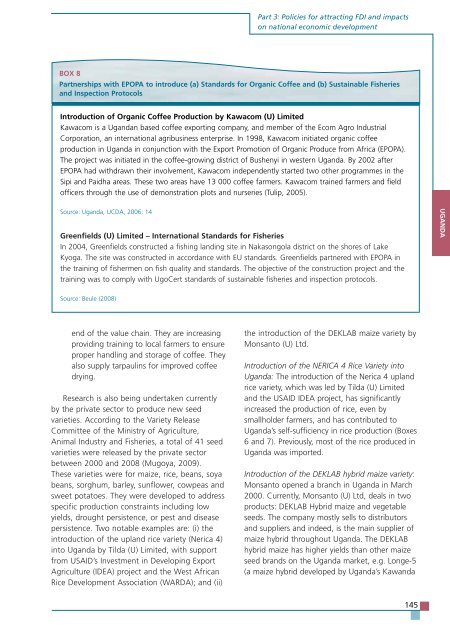TRENDS AND IMPACTS OF FOREIGN INVESTMENT IN DEVELOPING COUNTRY AGRICULTURE
TRENDS AND IMPACTS OF FOREIGN INVESTMENT IN DEVELOPING COUNTRY AGRICULTURE
TRENDS AND IMPACTS OF FOREIGN INVESTMENT IN DEVELOPING COUNTRY AGRICULTURE
Create successful ePaper yourself
Turn your PDF publications into a flip-book with our unique Google optimized e-Paper software.
Part 3: Policies for attracting FDI and impacts<br />
on national economic development<br />
BOX 8<br />
Partnerships with EPOPA to introduce (a) Standards for Organic Coffee and (b) Sustainable Fisheries<br />
and Inspection Protocols<br />
Introduction of Organic Coffee Production by Kawacom (U) Limited<br />
Kawacom is a Ugandan based coffee exporting company, and member of the Ecom Agro Industrial<br />
Corporation, an international agribusiness enterprise. In 1998, Kawacom initiated organic coffee<br />
production in Uganda in conjunction with the Export Promotion of Organic Produce from Africa (EPOPA).<br />
The project was initiated in the coffee-growing district of Bushenyi in western Uganda. By 2002 after<br />
EPOPA had withdrawn their involvement, Kawacom independently started two other programmes in the<br />
Sipi and Paidha areas. These two areas have 13 000 coffee farmers. Kawacom trained farmers and field<br />
officers through the use of demonstration plots and nurseries (Tulip, 2005).<br />
Source: Uganda, UCDA, 2006: 14<br />
Greenfields (U) Limited – International Standards for Fisheries<br />
In 2004, Greenfields constructed a fishing landing site in Nakasongola district on the shores of Lake<br />
Kyoga. The site was constructed in accordance with EU standards. Greenfields partnered with EPOPA in<br />
the training of fishermen on fish quality and standards. The objective of the construction project and the<br />
training was to comply with UgoCert standards of sustainable fisheries and inspection protocols.<br />
Source: Beule (2008)<br />
end of the value chain. They are increasing<br />
providing training to local farmers to ensure<br />
proper handling and storage of coffee. They<br />
also supply tarpaulins for improved coffee<br />
drying.<br />
Research is also being undertaken currently<br />
by the private sector to produce new seed<br />
varieties. According to the Variety Release<br />
Committee of the Ministry of Agriculture,<br />
Animal Industry and Fisheries, a total of 41 seed<br />
varieties were released by the private sector<br />
between 2000 and 2008 (Mugoya, 2009).<br />
These varieties were for maize, rice, beans, soya<br />
beans, sorghum, barley, sunflower, cowpeas and<br />
sweet potatoes. They were developed to address<br />
specific production constraints including low<br />
yields, drought persistence, or pest and disease<br />
persistence. Two notable examples are: (i) the<br />
introduction of the upland rice variety (Nerica 4)<br />
into Uganda by Tilda (U) Limited, with support<br />
from USAID’s Investment in Developing Export<br />
Agriculture (IDEA) project and the West African<br />
Rice Development Association (WARDA); and (ii)<br />
the introduction of the DEKLAB maize variety by<br />
Monsanto (U) Ltd.<br />
Introduction of the NERICA 4 Rice Variety into<br />
Uganda: The introduction of the Nerica 4 upland<br />
rice variety, which was led by Tilda (U) Limited<br />
and the USAID IDEA project, has significantly<br />
increased the production of rice, even by<br />
smallholder farmers, and has contributed to<br />
Uganda’s self-sufficiency in rice production (Boxes<br />
6 and 7). Previously, most of the rice produced in<br />
Uganda was imported.<br />
Introduction of the DEKLAB hybrid maize variety:<br />
Monsanto opened a branch in Uganda in March<br />
2000. Currently, Monsanto (U) Ltd, deals in two<br />
products: DEKLAB Hybrid maize and vegetable<br />
seeds. The company mostly sells to distributors<br />
and suppliers and indeed, is the main supplier of<br />
maize hybrid throughout Uganda. The DEKLAB<br />
hybrid maize has higher yields than other maize<br />
seed brands on the Uganda market, e.g. Longe-5<br />
(a maize hybrid developed by Uganda’s Kawanda<br />
145<br />
UG<strong>AND</strong>A


